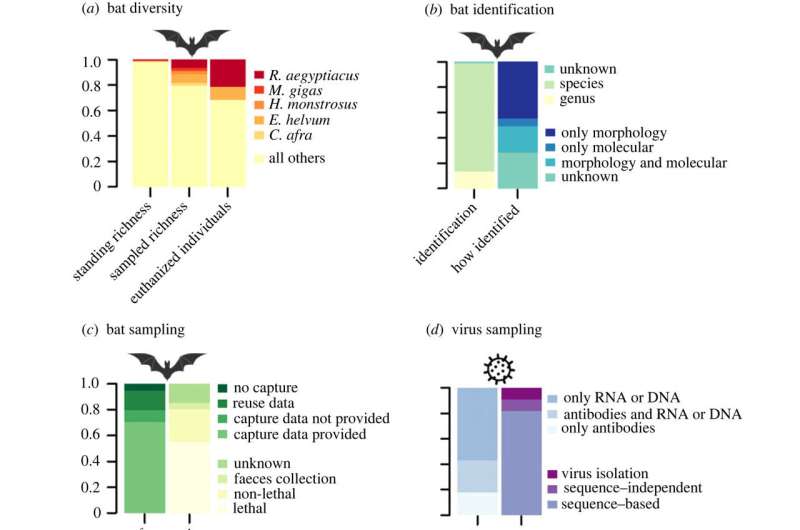This article has been reviewed according to Science X's editorial process and policies. Editors have highlighted the following attributes while ensuring the content's credibility:
fact-checked
peer-reviewed publication
trusted source
proofread
No evidence for widespread transmission of viruses by African bats, says study

The scientific community and the public alike have often been presented with portrayals of bats as carriers of numerous dangerous viruses that are passed onto humans. In a paper published in Biology Letters, an international team of biologists, virologists and conservationists challenge this narrative surrounding bats.
Contrary to widely held beliefs, this comprehensive review of published studies finds no evidence, outside of Marburg and Sosuga virus, that African bat species serve as reservoirs or bridging hosts for viruses that spillover to humans and cause significant disease.
The research team, led by Natalie Weber examined the available literature, specifically focusing on viruses detected in bats in Africa. They meticulously reviewed 162 papers published between 1978 and 2020 and, based on data from more than 80,000 individual bats from 167 bat species, did not find substantial evidence that any bat species, other than the Egyptian rousette, plays a central role in the transmission of viruses to humans in this region.
"We found no evidence to support the prevailing narrative that bats harbor viruses that are transmitted to humans. On the contrary, our findings reveal only two bat-virus systems in which transmission is clearly documented," says Natalie Weber.
Co-author DeeAnn Reeder notes that "the findings highlight the need for a more nuanced and informed approach to public discourse surrounding the role of wildlife in disease emergence." The authors thus propose a scheme to aid standardized evaluation of virus hosts in the future and call for greater interdisciplinary collaborations in bat-virus studies.
Bat misidentifications
This review also revealed that bat misidentifications and outdated species assignments were common in the published studies on viruses. Yet, species identification is of great importance for follow-up investigations, especially when a particular bat is determined to host a virus of interest. Besides, bats are often regarded as a singular entity, but it is crucial to acknowledge the substantial diversity within this group, which has diversified over tens of millions of years; Africa alone hosts no less than 324 different bat species.
"Instead of broadly stating bats harbor the Marburg virus, it is more accurate to specify that the Egyptian rousette, a specific bat species, hosts the Marburg virus," says co-author Sébastien Puechmaille. "This phrasing preserves accuracy and avoids incorrectly associating all bat species with the Marburg virus."
As global concerns about emerging infectious diseases persist, the researchers hope that their work will contribute to a more accurate understanding of the complex dynamics between wildlife, particularly bats, and human health.
Their study also raises concerns about the impact of reiterated research communication linking bats and viruses, based on missing evidence, on the public perception of bats, as well as human-bat conflicts and bat conservation efforts. "Fear and active prosecution of bats are increasing dramatically and it is likely that populations are declining across Africa," states co-author Dina Dechmann.
"Careful and scientifically sound communication of results as well as balancing potential risks against benefits will be crucial to allow humans and bats to live side by side in our changing world." The implications of this research extend beyond Africa, encouraging a more thoughtful and evidence-based approach to the study of zoonotic diseases worldwide.
More information: Natalie Weber et al, Robust evidence for bats as reservoir hosts is lacking in most African virus studies: a review and call to optimize sampling and conserve bats, Biology Letters (2023). DOI: 10.1098/rsbl.2023.0358
Journal information: Biology Letters
Provided by Max Planck Society


















